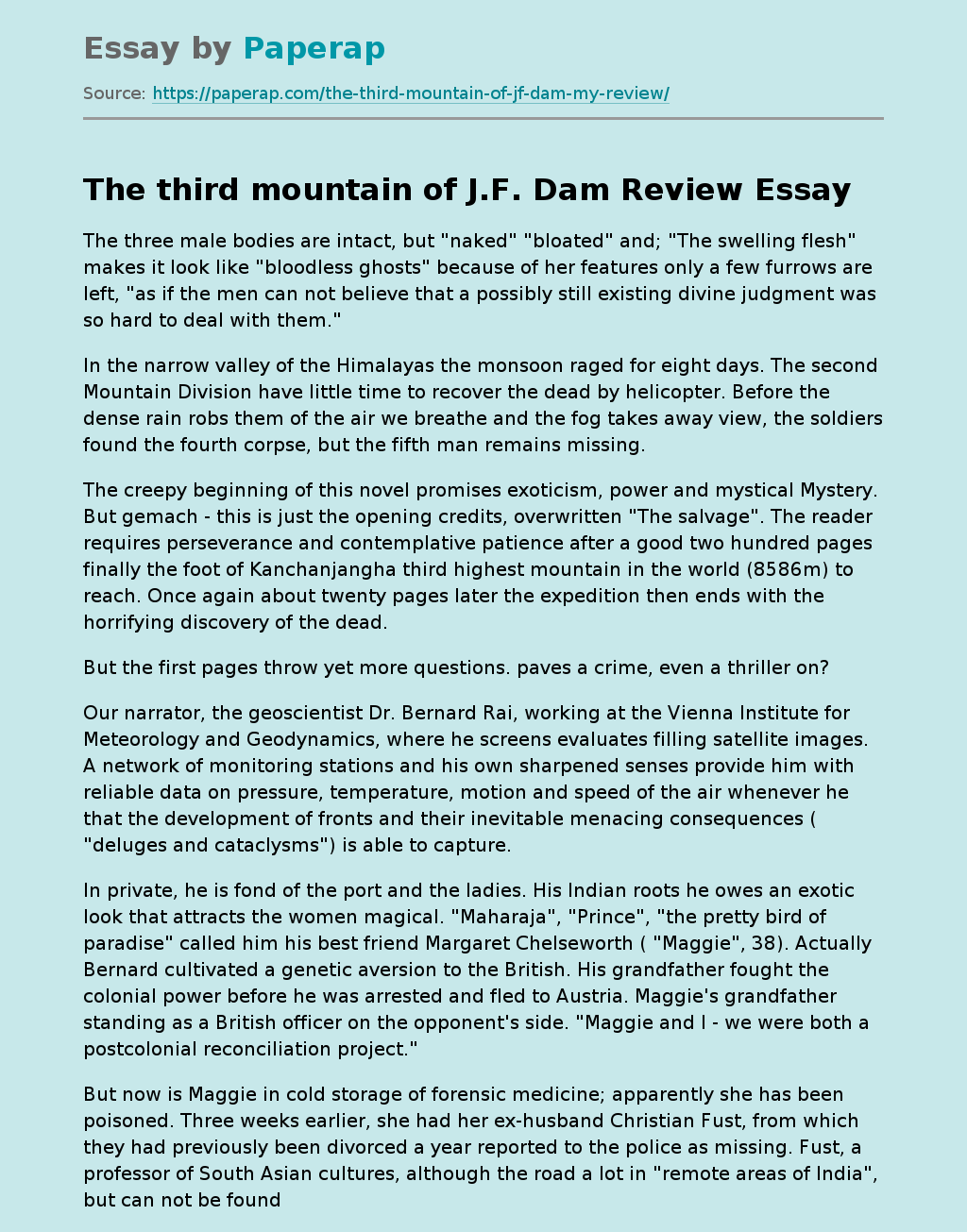“The Third Mountain” of J.f. Dam
The three male bodies are intact, but “naked” “bloated” and “The swelling flesh” makes it look like “bloodless ghosts” because of her features only a few furrows are left, “as if the men can not believe that a possibly still existing divine judgment was so hard to deal with them.”
In the narrow valley of the Himalayas the monsoon raged for eight days. The second Mountain Division have little time to recover the dead by helicopter. Before the dense rain robs them of the air we breathe and the fog takes away view, the soldiers found the fourth corpse, but the fifth man remains missing.
The creepy beginning of this novel promises exoticism, power and mystical Mystery. But gemach – this is just the opening credits, overwritten “The salvage”. The reader requires perseverance and contemplative patience after a good two hundred pages finally the foot of Kanchanjangha third highest mountain in the world (8586m) to reach. Once again about twenty pages later the expedition then ends with the horrifying discovery of the dead.
But the first pages throw yet more questions. paves a crime, even a thriller on? Our narrator, the geoscientist Dr. Bernard Rai, working at the Vienna Institute for Meteorology and Geodynamics, where he screens evaluates filling satellite images. A network of monitoring stations and his own sharpened senses provide him with reliable data on pressure, temperature, motion and speed of the air whenever he that the development of fronts and their inevitable menacing consequences ( “deluges and cataclysms”) is able to capture.
In private, he is fond of the port and the ladies. His Indian roots he owes an exotic look that attracts the women magical. “Maharaja”, “Prince”, “the pretty bird of paradise” called him his best friend Margaret Chelseworth ( “Maggie”, 38). Actually Bernard cultivated a genetic aversion to the British. His grandfather fought the colonial power before he was arrested and fled to Austria. Maggie’s grandfather standing as a British officer on the opponent’s side. “Maggie and I – we were both a postcolonial reconciliation project.”
But now is Maggie in cold storage of forensic medicine; apparently she has been poisoned. Three weeks earlier, she had her ex-husband Christian Fust, from which they had previously been divorced a year reported to the police as missing. Fust, a professor of South Asian cultures, although the road a lot in “remote areas of India”, but can not be found for some time. he had his scientific projects (emphasis on “old medical manuscripts in Sanskrit”) understandably shrouded in silence.
Although no order and ermittlerische experience, Bernard feels nevertheless obliged to trace Christian Fust on your own. Because he believes himself “complicit in Maggie’s death – omission miserable male intuition total unforgivable crime.”
Bernard We therefore travel to India and explore the mysteries of Ayurvedic medicine. The pharmaceutical industry has long been on site. If successful scientists like Fust progress in deciphering the ancient Sanskrit manuscripts, the mode of action could alter medicinal plants are identified, and then lure huge profits. “Soma”, for example, should be able to not only extend the life of men, but promises even immortality. Secrets of this magnitude must be treasured, and to protect some would stop at nothing. Bernard comes to the scientists dangerously close and must actually fear for his life.
What a fascinating concept for an unusual, sophisticated thriller! But unfortunately, The third mountain” is an abundant verkopftes, scattered and diffused structure. Again and again sweeps the narrative to other topics, such as to Bernards adventure as an environmental activist in Greenpeace fashion. Entern Verwegene Dinghy Pirates Mark luxury liner in the Antarctic and it medially effective as an environmental sinner: “luxury For You – Pest For the rest”. After all, this episode is entertaining and relevant to the Charakterierung Bernards. Many other passages but remain enigmatic simply.
also sometimes verquaste language style helps to mystification. The syntax is usually simple, but like revels Dam in his choice of words but in technical jargon. When Maggie from “early Tantrism” and “the difficult issue of the modification of the old Tridosha- and Ashtadhatu teachings by Vagbhata” chatter, she wants to provoke Christian – but there appears also a universal educated author who then rather keeps his knowledge to himself. The Annex with dense explanations of a few keywords and topics helps the layman not really; either you so just surfing through all the impressive foreign vocabulary of time (somehow the whole thing opens up already), or the way you google on the laptop.
Not that J.F. Dam did not know to formulate razor sharp. Witty formulations spray everywhere, especially digs at the British and Austria, “whose greatest asset present in his schadenlimitierenden smallness is”. But too often, the language of the narrator in hints that will never be concretized loses. Because Bernard is reminiscent of a weekend that he spent two years earlier with Christian and Maggie on the shores of Lake Garda. There were violent clashes, and “in this long evening solving Maggie puzzle is hidden somewhere.” But where? A moment later with several unknowns follows a new task: Bernard is “crying in nettles,” his mother Helene sips “of champagne orange” on the swing because “is a shadow (…) with arms outstretched to me (why?) “. ” ‘What are you doing here,’ I ask question back,” says the shadow?”.
“The Third Mountain” of J.f. Dam. (2019, Nov 18). Retrieved from https://paperap.com/the-third-mountain-of-jf-dam-my-review/

